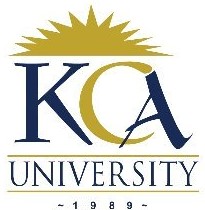 UNIVERSITY EXAMINATIONS: 2012/2013
UNIVERSITY EXAMINATIONS: 2012/2013
EXAMINATION FOR DEGREE OF BACHELOR OF COMMERCE
KCAU 001 INFORMATION LITERACY (SATURDAY)
DATE: DECEMBER 2012 TIME: 1 HOUR
INSTRUCTIONS: Answer Question ONE and any other TWO Questions
QUESTION ONE (15 MARKS)
Students, researchers and scholars doing research and writing other academic essays are
required to cite sources used. They can either use American Psychological Association
(APA) or Harvard referencing style. The following journal article and print book
bibliographic details are some of the sources used by John Mwangi when writing his research
project. His University requires that all academic writings must be cited and referenced using
the American Psychological Association, 6th edition, 2010.
Journal Article:
Author: Marianna Sigala and Kalotina Chalkiti
Title: Improving performance through tacit knowledge externalization and utilization
Source: International Journal of Productivity and Performance Management
Vol. 56, No.6, 2007,pp.456-483
Print Book:
The management of technological innovation:strategy and practice by Mark Dodgson, David
Gann and Ammon Salter.
Published in the United States by Oxford University Press, New York
Copyright© Oxford University Press, 2008
Required
a) Having completed a training on citations and referencing recently, using appropriate
examples, show Mr. Mwangi how citations are done, both paraphrased and direct
quotations from the journal article and the print book. Let the direct quotation be from
page 457 of the journal article and the paraphrased citation from the print book.
(4 Marks)
b) Compile the references at the end of the essay assignment or research project for the
journal article and the print book. (11 Marks)
QUESTION TWO (10 MARKS)
a) Explain five reasons why information literacy is important in higher education in
Kenya and the rest of the world. (5 Marks)
b) Explain five reasons why selecting information sources provided by libraries should
be prioritized over what is available freely on the web. (5 Marks)
QUESTION THREE (10 MARKS)
a) After completing your information literacy training recently, you have been appointed
to be in charge of helping students doing research in your university. One of your
clients (John) wants to know the best electronic resources available for his
information needs. With appropriate reasons, identify for John any 5 electronic
databases subscribed by your university library (5 Marks)
b) Having a catalogue in any library is vital. Outline the importance of a library
catalogue in your university studies. (5 Marks)
QUESTION FOUR (10 MARKS)
a) When planning for the information task, the typology of information skills consists of
three stages. Clearly outline and explain the third stage (6 Marks)
b) Write short notes on the following concepts as used in information literacy (4 Marks)
(i) Lifelong learning
(ii) Boolean operator
(iii) Information literate individual
(iv) Electronic journals
QUESTION FIVE (10 MARKS)
a) Define plagiarism and Plagiarist (2 Marks)
b) Using information retrieved ethically is one the most important information literacy
skills. Explain the various types of plagiarisms. (4 Marks)
c) Explain some of the strategies that can be used to avoid plagiarism when writing
academic essays and research (4 Marks)
